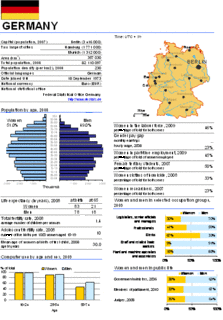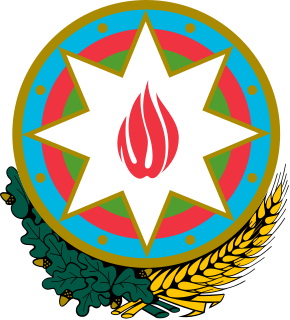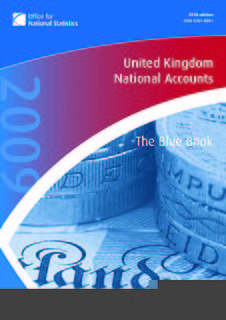Related Research Articles

The United Nations Economic Commission for Europe is one of the five regional commissions under the jurisdiction of the United Nations Economic and Social Council. It was established in order to promote economic cooperation and integrations among its member states.

Natural capital is the world's stock of natural resources, which includes geology, soils, air, water and all living organisms. Some natural capital assets provide people with free goods and services, often called ecosystem services. All of these underpin our economy and society, and thus make human life possible.

The Bureau of Economic Analysis (BEA) of the United States Department of Commerce is a U.S. government agency that provides official macroeconomic and industry statistics, most notably reports about the gross domestic product (GDP) of the United States and its various units—states, cities/towns/townships/villages/counties, and metropolitan areas. They also provide information about personal income, corporate profits, and government spending in their National Income and Product Accounts (NIPAs).
The green gross domestic product is an index of economic growth with the environmental consequences of that growth factored into a country's conventional GDP. Green GDP monetizes the loss of biodiversity, and accounts for costs caused by climate change. Some environmental experts prefer physical indicators, which may be aggregated to indices such as the "Sustainable Development Index".

Eurostat is a Directorate-General of the European Commission located in the Kirchberg quarter of Luxembourg City, Luxembourg. Eurostat’s main responsibilities are to provide statistical information to the institutions of the European Union (EU) and to promote the harmonisation of statistical methods across its member states and candidates for accession as well as EFTA countries. The organisations in the different countries that cooperate with Eurostat are summarised under the concept of the European Statistical System.
The Partnership in Statistics for Development in the 21st Century, or PARIS21, was established in November 1999 by the United Nations, the European Commission, the Organisation for Economic Co-operation and Development (OECD), the International Monetary Fund, and the World Bank as a response to the UN Economic and Social Council resolution on the goals of the UN International Conference on Financing for Development. PARIS21's main objective is "to achieve national and international development goals and to reduce poverty in low and middle income countries". In pursuit of this, PARIS21 "facilitates statistical capacity development, advocates for the integration of reliable data in decision-making, and coordinates donor support to statistics". The PARIS21 Secretariat is hosted within the Statistics and Data Directorate of the OECD in Boulogne-Billancourt, France.

National accounts or national account systems (NAS) are the implementation of complete and consistent accounting techniques for measuring the economic activity of a nation. These include detailed underlying measures that rely on double-entry accounting. By design, such accounting makes the totals on both sides of an account equal even though they each measure different characteristics, for example production and the income from it. As a method, the subject is termed national accounting or, more generally, social accounting. Stated otherwise, national accounts as systems may be distinguished from the economic data associated with those systems. While sharing many common principles with business accounting, national accounts are based on economic concepts. One conceptual construct for representing flows of all economic transactions that take place in an economy is a social accounting matrix with accounts in each respective row-column entry.

The System of National Accounts is an international standard system of national accounts, the first international standard being published in 1953. Handbooks have been released for the 1968 revision, the 1993 revision, and the 2008 revision. The System of National Accounts, in its various released versions, frequently with significant local adaptations, has been adopted by many nations. It continues to evolve and is maintained by the United Nations, the International Monetary Fund, the World Bank, the Organisation for Economic Co-operation and Development and the Statistical Office of the European Communities
Statistics Denmark is a Danish governmental organization under the Ministry of the Interior and Housing and which reports to the Minister of Economic and Internal Affairs. The organization is responsible for creating statistics on the Danish society, for example employment statistics, trade balance, and demographics.

The United Nations Department of Economic and Social Affairs is part of the United Nations Secretariat and is responsible for the follow-up to major United Nations Summits and Conferences, as well as services to the United Nations Economic and Social Council and the Second and Third Committees of the United Nations General Assembly. UN DESA assists countries around the world in agenda-setting and decision-making with the goal of meeting their economic, social and environmental challenges. It supports international cooperation to promote sustainable development for all, having as a foundation the 2030 Agenda for Sustainable Development and the 17 Sustainable Development Goals (SDGs) as adopted by the UN General Assembly on 25 September 2015. In providing a broad range of analytical products, policy advice, and technical assistance, UN DESA effectively translates global commitments in the economic, social and environmental spheres into national policies and actions and continues to play a key role in monitoring progress towards internationally agreed-upon development goals. It is also a member of the United Nations Development Group.

Official statistics are statistics published by government agencies or other public bodies such as international organizations as a public good. They provide quantitative or qualitative information on all major areas of citizens' lives, such as economic and social development, living conditions, health, education, and the environment.
Water accounting is a discipline that seeks to provide comprehensive, consistent and comparable policy relevant information related to water. Based on the experience of more than fifty years of national accounts, the discipline that provides the elements to calculate the Gross Domestic Product (GDP), the United Nations Statistics Division (UNSD) developed the System of Environmental and Economic Accounting for Water (SEEA-Water), which has been adopted by the United Nations Statistical Commission (UNSC) as a statistical interim standard in 2007.

The State Statistics Committee of Azerbaijan Republic is a governmental agency within the Cabinet of Azerbaijan in charge of collection, processing and disseminating statistical data on the economy, demographics and other sectors of activity in Azerbaijan Republic. The agency is headed by Arif Valiyev.
System of Environmental-Economic Accounting (SEEA) is a framework to compile statistics linking environmental statistics to economic statistics. SEEA is described as a satellite system to the United Nations System of National Accounts (SNA). This means that the definitions, guidelines and practical approaches of the SNA are applied to the SEEA. This system enables environmental statistics to be compared to economic statistics as the system boundaries are the same after some processing of the input statistics. By analysing statistics on the economy and the environment at the same time it is possible to show different patterns of sustainability for production and consumption. It can also show the economic consequences of maintaining a certain environmental standard.
Economy-wide material flow accounts (EW-MFA) is a framework to compile statistics linking flows of materials from natural resources to a national economy. EW-MFA are descriptive statistics, in physical units such as tonnes per year.
Although for many decades, it was customary to focus on GDP and other measures of national income, there has been growing interest in developing broad measures of economic well-being. National and international approaches include the Beyond GDP programme developed by the European Union, the Better Lives Compendium of Indicators developed by the OECD, as well as many alternative metrics of wellbeing or happiness. One of the earliest attempts to develop such an index at national level was Bhutan's Gross National Happiness Index and there are a now a number of similar projects ongoing around the world, including a project to develop for the UK an assessment of national well-being, commissioned by the Prime Minister David Cameron and led by the Office for National Statistics.
Environmental protection expenditure accounts (EPEA) are a statistical framework that describes environmental activities in monetary terms and organises these statistics into a full set of accounts, just like that of the national accounts. The EPEA is part of the System of Integrated Environmental and Economic Accounting which, in March 2012, was adopted as a statistical standard by the United Nations Statistical Commission.
Natural capital accounting is the process of calculating the total stocks and flows of natural resources and services in a given ecosystem or region. Accounting for such goods may occur in physical or monetary terms. This process can subsequently inform government, corporate and consumer decision making as each relates to the use or consumption of natural resources and land, and sustainable behaviour.

The annual United Kingdom National Accounts records and describes economic activity in the United Kingdom and as such is used by government, banks, academics and industries to formulate the economic and social policies and monitor the economic progress of the United Kingdom. It also allows international comparisons to be made. The Blue Book is published by the UK Office for National Statistics alongside the United Kingdom Balance of Payments – The Pink Book.
Monitoring and Evaluation (M&E) Purpose of M&E the performance of projects, institutions and programmes set up by governments, international organisations and NGOs. Its goal is to improve current and future management of outputs, outcomes and impact. Monitoring is a continuous assessment of programmes based on early detailed information on the progress or delay of the ongoing assessed activities. An evaluation is an examination concerning the relevance, effectiveness, efficiency and impact of activities in the light of specified objectives.